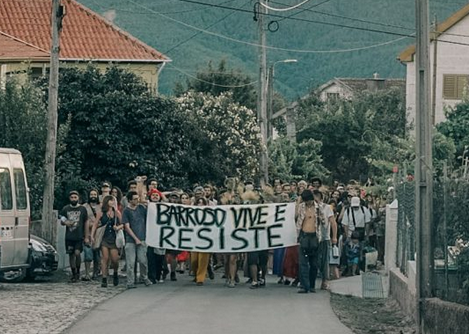United in Defense of Covas do Barroso intervention at the Portuguese Parliament, environment commission.
11 December 2024
In the name of the Association Unidos em Defesa de Covas do Barroso, we are here to list the various reasons why the “Mina do Barroso” project by Savannah Resources should not be considered a “strategic project” and must be immediately halted.
The “Mina do Barroso” project involves the opening of 4 open-pit mines, 1 processing plant that would operate 24 hours a day, 7 days a week, 1 permanent tailings dam, and 3 waste heaps, covering a total area of 592 hectares, and located just 150 meters from people’s homes. The project would be situated in the Barroso region, the only area in Portugal classified as a World Agricultural Heritage by the United Nations. For 7 years, local populations, authorities, and national and international movements and associations have opposed this project.
We do this for several reasons.
Firstly, due to the way the entire licensing process for this project has been handled, which shows that this is a political decision rather than a technical one.
Let’s see:
In 2006, the state signed a mining contract for quartz and feldspar covering 120 hectares. In 2016, this contract was completely modified through an addendum: the area was increased from 120 to 548 hectares, and lithium was added as a mineral – all without consulting the local populations or authorities. This modified contract was transferred to Savannah in 2017. In February 2022, the Local Council of Covas do Barroso filed a lawsuit regarding how the contractual procedures were carried out.In 2020, Savannah submitted an Environmental Impact Assessment for an area of 592 hectares.
This assessment was deemed “non-compliant” twice by the APA (Agência Portuguesa do Ambiente/Portuguese Environment Agency), in July and December 2020. In January 2021, the Montescola Foundation formally requested access to all documents related to the Mina do Barroso. The APA ignored this request. In March 2021, the CADA (Comissão de Acesso aos Documentos Administrativos/Commission for Access to Administrative Documents) issued a final statement ordering the APA to provide the documents.
However, instead of complying with these demands, the APA made the Environmental Impact Assessment available for public consultation. These violations related to access to environmental information and public participation were also raised with the European Parliament and the Compliance Committee of the Aarhus Convention, to which Portugal is a signatory.
After a year waiting, in July 2022, the project received an “unfavorable” opinion: the APA’s Evaluation Commission pointed out “very significant negative impacts, in some cases irreducible, on water resources, ecological systems, landscapes, and the socioeconomy.” Although this technical opinion from the APA was clear, it was not supported by the DGEG (Directorate-General for Energy and Geology/Direção Geral de Energia e Geologia/), which wrote: “Lithium is a mineral that plays a central role in the entire agenda of energy transition and decarbonization of the economy.” Under Article 16 of the Legal Regime for Environmental Impact Assessment, an additional six months were granted to the company to rework its project.
This is how a rigorous technical decision was ignored in favor of a political decision.
In March 2023, Savannah submitted the reworked Study. In May, the APA issued a conditional favorable DIA (Declaração de Impacto Ambiental/Environmental Impact Statement). The framework of the APA’s opinion is as follows: “Lithium is a mineral that plays a central role in the entire agenda of energy transition and decarbonization of the economy (…) Lithium is an essential metallic mineral for modern society, as recognized by the European Commission in its Critical Raw Materials Initiative.”
In short, the successive violations of the right to access information and the way in which technical opinions are ignored in favor of political guidelines demonstrate that the issuance of this DIA is a political choice.In September 2023, the Covas do Barroso Local Council initiated two legal actions to challenge the DIA. In February 2024, the Public Prosecutor’s Office sided with the local authorities, referencing several laws that were violated, thus supporting the argument that the DIA was more the result of political will than a transparent evaluation process conducted within legal parameters.
If there were any remaining doubts, consider the following: since the company does not have access to the land because the population is opposed, and since 71% of the concession area is on common land, where access rights are made by collective decision, the company requested the DGEG to issue an administrative easement to carry out the exploration activities required by the DIA.
Private landowners and the Common Lands received letters from the DGEG stating that their “response would most likely be favorable.” We decided, however, to exercise our right to a prior hearing. To our astonishment, on December 6th, we read in the Official Gazette that the administrative easement had been granted! In other words, the company will have access to the land, both private and common, even against the will of the populations and local authorities!
Since receiving the DIA, the company, with the complicity of the State, has tried to criminalize resistance and silence opposition. Between October 2023 and May 2024, we had a daily patrol of the GNR (Guarda Nacional Republicana/National Republican Guard) in Covas do Barroso. According to the local command, these orders “came from above.” The company also hired private security. The use of police and private security forces is a tactic to create intimidation and fear. We had private security guards patrolling in the early morning in front of people’s houses when they should only have been guarding the company’s land. We had the GNR conducting abusive searches of elderly people at dusk, without any grounds.
Since the company could not access much of the land it needs, it attempted to usurp a common land parcel in November 2023. For 8 months, we maintained a daily blockade of that land until the company gave up. During the blockades, GNR officers engaged in several instances of abuse of authority. They threatened to forcibly remove people and tried to intimidate others by saying they “would have to pay the price for the machines being idle.”
Moreover, the company has already filed two unfounded criminal charges against the president of our Association. This type of litigation is called SLAPPs (Strategic Lawsuits Against Public Participation), as it is a clear attempt to criminalize and silence opposition by making it bear the judicial costs. These actions violate EU rules designed to protect communities from such abusive actions, as highlighted by our Ombudsman in her latest report submitted to the United Nations in April 2024.They have tried everything to make us silent.
The last straw is now the classification of “strategic project.” Although this is more of a label than a license, this classification will have long-lasting social, economic, and environmental implications. If granted, the project will be considered of “superior national interest” and is expected to receive political and financial support. Unfortunately, nearly half a year after the publication of the European Regulation on Critical Raw Materials, there has been no broad debate on strategic projects, and to date, Portugal and the European Commission have refused access to documents related to applications, which has led to a new complaint being filed with CADA, as this constitutes another violation of the Aarhus Convention.
European Union institutions claim that mining in European territory is subject to the highest environmental and social standards in the world. However, this notion is unfounded for several reasons. In the case of the Barroso Mine, the method proposed for the tailings dam is illegal in Brazil, Chile, Ecuador, and Peru, and has even been denounced by the mining industry. Moreover, the company proposes that this dam – which is permanent – be located less than 1km from the river, which would be illegal even in China.
In the report it submitted during the public consultation for the Environmental Impact Study, Dr. Steven Emerman, one of the leading experts on mine tailings and author of widely recognized guidelines for their responsible management in the mining industry, points out this illegality and the risk that the tailings dam poses to the Douro River Basin. The sediments could reach the river mouth in Porto. However, his technical opinion was ignored and has not received any rebuttal to date.
For all of the reasons outlined, we urge the Members of Parliament to take a firm stand against the possibility of the Barroso Mine being classified as a “strategic project.” If we allow these mines to go ahead, we will be making a grave ecological, social, political, and economic mistake. These mines are far from being just a problem for the Barroso region or the Douro River Basin. Without a doubt, that is where their impact will be most direct and visible, but the entire national territory will pay the price of destroying one of the largest water reserves we have in our country, and the consequences of an energy transition policy that only shifts and amplifies negative impacts without solving the underlying problems we face.
Wrong policies must be questioned and revised, not followed blindly just “because Europe decided so.” We need political action committed to people and territories, rather than serving as echo chambers for the European Commission. Our European commitment also involves questioning what is not right. In the midst of the climate, ecological, and environmental crises, destroying one of the greatest biodiversity treasures we have – Barroso – would be the biggest mistake our country could make.
As the Environment Committee, Ladies and Gentlemen, we ask that you do not remain silent and not let this project proceed. We will continue to resist, and it will not be the ghost of inevitability or the Central Government’s power that will dissuade us.
11 of December, 2024
Follow and support the struggle against mining:
https://linktr.ee/udcovasdobarroso


Deixe um comentário